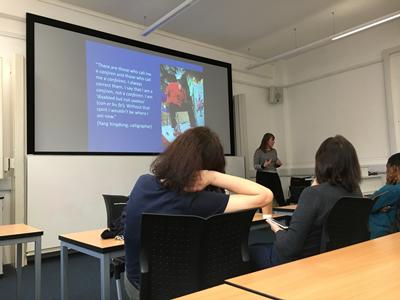Speech on “Who defines what it means to be ‘disabled’ in China today?” by Dr Sarah Dauncey from University of Nottingham

On 6th March 2019, held by Centre for Transnational Studies and sponsored by the Confucius Institute at the University of Southampton (CI Soton), a speech on “Who defines what it means to be ‘disabled’ in China today?” was given by Dr Sarah Dauncey from University of Nottingham, at Avenue Campus. Ying Zheng, Director of CI Soton attended the event. Around 20 audience attended the speech and evolved in the Q&A session.
In this talk, Sarah Dauncey looked at the construction of disabled identities specifically from the perspective of Chinese cultural epistemologies. Drawing on sociological theories of citizenship, her research reveals how traditionally accepted notions of personhood are often fundamentally challenged through encounters and interactions with understandings of disability and impairment. She provided engaging examples of the ways in which representations and narratives of disability negotiate the identity of their subject(s) in relation to dominant discourses, where collective social, political and cultural understandings of what it means to live a ‘productive’ disabled life are both imbued and contested. Her findings offered new evidence as to the importance of intersectional accounts of disabled citizenship in revealing the complex and shifting power relationships between disabled individuals and/or groups and the state in any particular country or specific cultural context.
The speech opened up a new way for people in Southampton to have a better understanding of Chinese construction of disabled identities.